|
A key challenge facing anyone tasked with reviewing an older film (a term whose definition will vary considerably depending on the age of the writer) is the problem of contextualising it to the time and location in which it was made. What scared an audience back in 1931, for example, is very different to what will be required to get filmgoers hiding under their seats today. Many great comedies from the early days of cinema can still get a receptive audience chuckling, but many others are so tied to the trends and tastes of a particular era that it can be hard for a modern viewer to even appreciate why anyone ever thought they were funny in the first place. Our own tastes can also change over time, and I certainly remember being amused by films or TV shows that years later prompted from me only a stony-faced silence. When this happens, it tends to lay bare the process by which a gag was conceived and executed, which can leave you with the sense that you're watching the first draft of a work that only when finished might have them rolling in the aisles.
Which brings me to the 1966 British black comedy-farce, The Wrong Box, a film that wasn't a big critical or commercial hit on its release – particularly in the UK – but that many now hold in high regard. I thus re-approached a film I haven't seen since childhood fully expecting to do response with similar delight. I and more significant others have certainly championed our share of films that received a critical drubbing on release and that went on to become cult or even popular hits (Blade Runner, anyone?). I thus found it a tad discomforting to find that I was largely in agreement with much of what those early reviewers had to say, hence my opening paragraph. But before I get to the specifics, let's have a look at the plot.
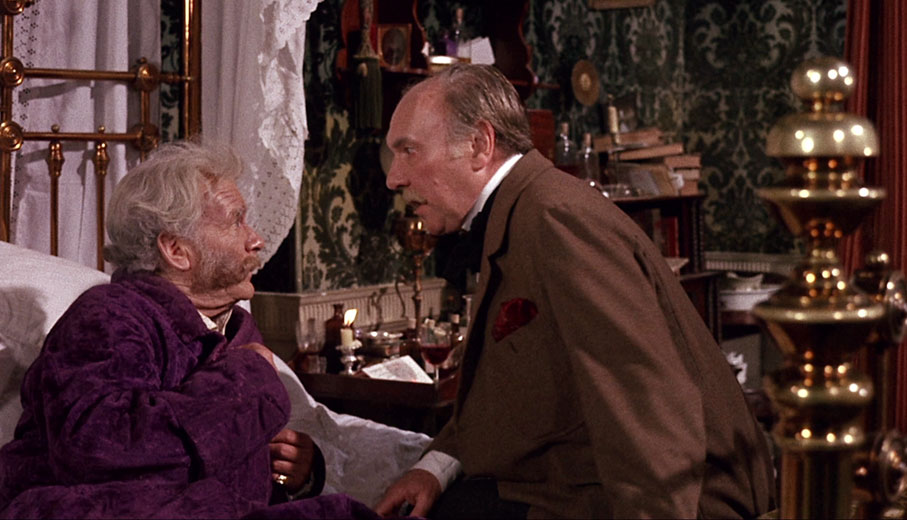
In 1918 England at what looks like one of those ancient public schools where some of the worst this country has to offer spent their formative years, a tontine (a term I confess I was not previously familiar with) is set up for a group of young boys, a sum of money that is set to increase substantially in value in the decades to come and that will be paid in full to the last surviving member of the group. I'm not sure about you, but to me that sounds like a solid motive for murder from the off. In the years that follow, this group is whittled down considerably in size as its members meet comically preposterous deaths, until the only two remaining possible beneficiaries are the elderly Masterman Finsbury and his brother Joseph, who live next door to each other but haven't spoken in years. The bedridden but cantankerous Masterman is determined to win the money to ensure the financial stability of his grandson Michael, an uninspiring medical student who lives with him and attends to his needs. The eccentric Joseph, meanwhile, has been shipped off to Bournemouth by his scheming nephews Morris and John, who are equally determined that the money should go their uncle, whom they are mollycoddling in an effort to protect him from illness or physical harm. When Masterman summons John to his bedside under the false pretext that he is not long for this Earth, the avaricious Morris and John bundle Uncle Joseph onto a train and head for London, unaware that Masterson plans to murder his brother. When the train is involved in a head-on crash, however, Morris and John are wrongly convinced that their uncle has been killed, a misfortune they set about concealing in order to claim the tontine when Mastermon croaks.
If this seems a little convoluted then be aware that we're just getting started here, but working in the film's favour is the fact that at no time are we left confused about what is going on (well I wasn't – the commentary confirms that not everyone is of the same view) thanks in part to the sometimes leisurely pace at which the early narrative unfolds. It also has an absolute mother of a cast – seriously, there are an almost bewildering number of famous faces in this film, including four of the finest comedy talents this country has ever produced. How, then, could anyone have an issue with such a work?
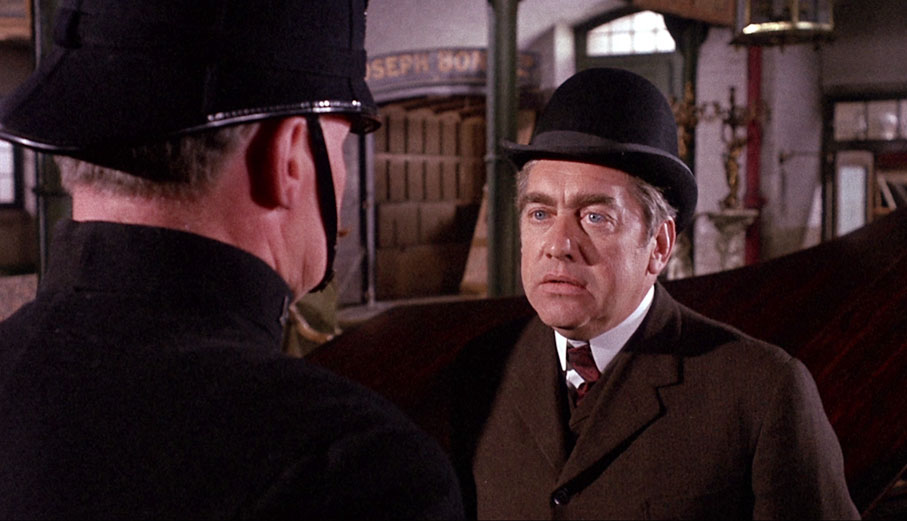
OK, let me start by saying that I didn't dislike The Wrong Box and indeed have nothing but praise for some of its qualities, including one that I'll get to shortly that gave me more pleasure than anything else I've watched in a long while. I also find it difficult to start listing specific things that I liked or didn't care for because these two things are often so tightly intertwined. Take the aforementioned cast of familiar faces. This is, without doubt, a major attraction and would have been especially so on the film's initial release. I mean, just look at this roster: Michael Caine, Ralph Richardson, John Mills, Nanette Newman, Peter Cook, Dudley Moore, Tony Hancock, Peter Sellers, Thorley Walters, Gerald Sim, Norman Bird, John Le Mesurier, Graham Stark, Leonard Rossiter, André Morrell, John Junkin… Shall I continue? Indeed, there are so many famous faces here that the film almost suffers from celebrity overload. Like John Boulting's The Magic Box before it, this wealth of British talent of the day both brings something special to the film and simultaneously risks detracting from it as you find yourself playing the "spot the celebrity" game and shouting out, "Wait a minute, wasn't that…?" every time one of them puts in a brief guest appearance (a criticism that was also levelled at Stanley Kramer's 1963 It's a Mad Mad Mad World) instead of seeing them as a characters in the unfolding story. And while a few have substantial roles, most appear for a couple of brief scenes at best and sometimes only a single shot or two – you'll need to be paying attention during the opening ten minutes to recognise James Villiers, Graham Stark, Nicholas Parsons and Valentine Dyall, while if you sneeze at the wrong moment you might miss Leonard Rossiter completely.
There's also a sense (something that was picked up by contemporary reviews) that some of the key players here are a little outside their comfort zone. The TV sketches of Peter Cook and Dudley Moore can still reduce me to helpless giggles all these years later, but asked to play leading roles in their first feature and deliver someone else's dialogue, they're energetic and daffy. But this is Peter Cook and Dudley Moore we're talking about – these guys were bloody hilarious when on form, and watching them here I kept waiting for the explosion of needle-sharp character comedy we all know they were capable of delivering, but it never comes. As Michael Finsbury, a post-Alfie Michael Caine also feels a little misplaced, required as he is to feign the sort of upper-middle class accent that he never seemed completely comfortable with and which to my jaded ears always sounded like the imitation it technically was. This effectively neuters the on-screen charm he could radiate when able to deliver lines in his normal speaking voice and imposes an artificiality on elements of his performance that for me makes his namesake character one of the least interesting in the film, and he's the romantic lead. I'm similarly ambivalent about Nanette Newman as his cousin and love interest Julia, who I'm going to risk suggesting was cast as the epitome of the lovely girl-next-door beauty primarily because she was director Bryan Forbes' wife. Don't get me wrong, Newman has proved her acting chops on a number of occasions (including in Forbes' later The Stepford Wives, where her casting infuriated screenwriter William Goldman), but like Caine she plays her role with an air of performed artificiality that some will doubtless find amusing but I really struggled with. This really hits home in an early scene in which Michael and Julia dance around their attraction for each other in what was presumably meant to be a parody of a romantic drawing room play, which would probably be fine if it was funny. Again, this will be a matter of comedic taste, and elsewhere on this disc you'll find evidence that others have found their interaction delightful. Tony Hancock comes and goes too quickly to make an impression (this was his last film and he was by then far from his peak), and while there's fun to be had with Peter Sellers' role as cat-loving eccentric quack Doctor Pratt, it's one with elements familiar enough to have me thinking, "Ah, he's doing his dotty old twerp routine." His performance is still one of the highlights of the film, and the absent-minded way he uses nearby cats as a hand-towel or an ink blotter made for two of the funniest sight gags in the film.
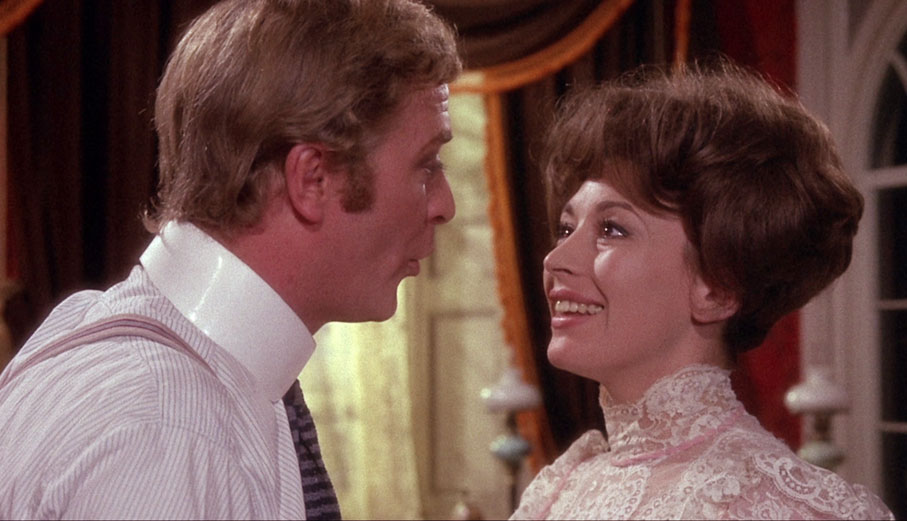
I have a suspicion that the screenplay by Larry Gelbart and Burt Shevelove – which was ‘suggested by' novels by Robert Louis Stevenson and Lloyd Osbourne – is wittier than it sometimes feels, and do wonder how much of that is down to the delivery. Take the moment Julia reveals her concern about murders being committed in London by a man known as The Bournemouth Strangler (we can presume he kills them on day trips) and says to the visiting Michael, "I'm sorry to seem so inhospitable but in the past twelve months alone, over 320 girls in the Greater London area have been attacked by persons unknown and many of them unnecessarily mutilated." It's a line that really registered when I watched the film a second time and one that later amused the hell out of me, first for the preposterously high murder count and second for the words "unnecessarily mutilated," which infers that while murder is unpleasant, mutilation is taking things a bit too far (how very English), but also obliquely suggests that there is also a form a mutilation that is somehow acceptable or even necessary. The problem is, it didn't make me laugh when I heard it, only when I thought about it later and had divorced the line from the actor's delivery of it. A few lines do still hit their mark successfully, however. A personal favourite comes after a head-on train crash leaves the opposing locomotives butting heads at a spectacular angle, and one of the engine drivers (a blink-and-you'll-miss-him role for John Junkin) observes the catastrophic mess and says wearily to his colleague, "We haven't heard the last of this."
Probably the film's most bemusing misstep is the inclusion of occasional caption cards, which comment on the action in the manner of a silent movie but have more than a whiff of 60s psychedelia about their design. Although this was not the only film of the period to include such captions, there's no pattern or logic to their intermittent appearance here. They're not remotely witty and sometimes just point out the bloody obvious ("A real funeral procession" a card announces as the film itself makes this patently clear), and are as incongruous to the action and disruptive to the narrative flow as those absurd comic-book frames that Walter Hill inserted into the Director's Cut of The Warriors. Still, they do provide Forbes a bargain basement way of avoiding the expense of staging a train crash or a collision involving multiple horse-drawn coaches.
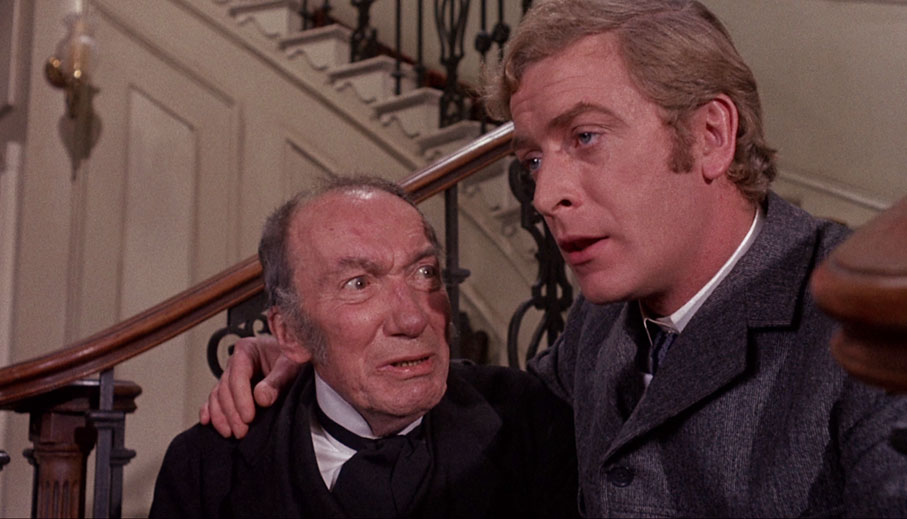
Yet as I suggested above, I still found things to admire and enjoy here. The early montage of the idiotic deaths that befall so many of those in tontine (and in which so many rapid cameos come and go) may have taken its inspiration from Kind Hearts and Coronets, but is so inventive in its conception and so ambitious in execution that it can comfortably stand on its own considerable merits. There are also a couple of gems in the cast. As the polite but boorish Joseph Finsbury, Ralph Richardson is funnier than all of the film's comedians, spouting an endless stream of uninteresting trivia with which he unwittingly drives everyone he meets to distraction (an extra level of amusement is provided by the knowledge that his co-star Michael Caine became notorious for regaling his friends and fellow actors with such trivia). Best of all by a long shot, however, is Wilfred Lawson's absolute gem of a performance as Masterman's ageing butler Peacock. Unique even amongst cinema's long history of wizened and eccentric butlers, Peacock is so gloriously funny that despite only appearing intermittently, his scenes are worth seeing the film for alone and would be worth buying this disc for to re-watch at your leisure. It's difficult to put into words precisely what it is that makes Lawson such as a delight here, but try to imagine man with the posture and spoken delivery of an elderly manservant who, whilst cheerfully devoted to the family he serves, is constantly doing battle with the ravages of age and trying to mask the fact that he is permanently and spectacularly drunk (Lawson himself was notoriously fond of the booze and according to Caine was permanently plastered). His first appearance had me roaring, and there's a short sequence involving a piano that is caught in a doorway that made me laugh so hard that I had to put the film on pause to avoid missing the scene that followed.
For some, perhaps for many, this uneven mix of various comedy styles and frequent changes of pace and tone will be part of the quirkiness that makes the film fun. I absolutely get that and can easily see how this comic cornucopia could come across as charming and entertaining, but it just didn't click for me. Appreciation of a particular branch of art or entertainment is not a science but very much down to personal taste, something especially true of comedy, where one person's comic genius can be another's nightmare. You'll even catch of a whiff of this at the very start of the commentary track, when the BFI's Jo Botting cheerfully proclaims that this is one of her favourite films, and her colleague Vic Pratt's inability to contain his surprise has a faint but still detectable air of "what, seriously?" about it. Yet for all my complaints, I rather liked the film and laughed harder at a couple of sequence than I have at anything else this year (not that it's been one of my happier years, but you get my drift). Uneven, a little dated but rather quaint in that provincially British way, it's less amusing than it probably once seemed but rises to occasional moments of comedy gold. I'm willing to bet a good many of you reading this will get far more out of it than I did, but even if your taste in comedy is tragically aligned to mine, I'd still recommend seeing it for that cast, for the wonderful Wilfred Lawson, and for a handful of gags that really do hit the bullseye.
An other nice HD restoration from Sony that ticks all the right boxes – the detail is consistently sharp, the contrast nicely balanced, the black levels crisp without punishing shadow detail, and the colour reproduction is very pleasing and even vibrant when appropriate, with no errant colour tints due to age and fading. The image is framed 1.74:1, which is not an aspect ratio I'm familiar with, but I've been given a few surprises on this score in recent months so am not in a position to comment on whether this was how it was original projected. Any damage and dust has been scrupulously cleaned up and a fine film grain is visible.
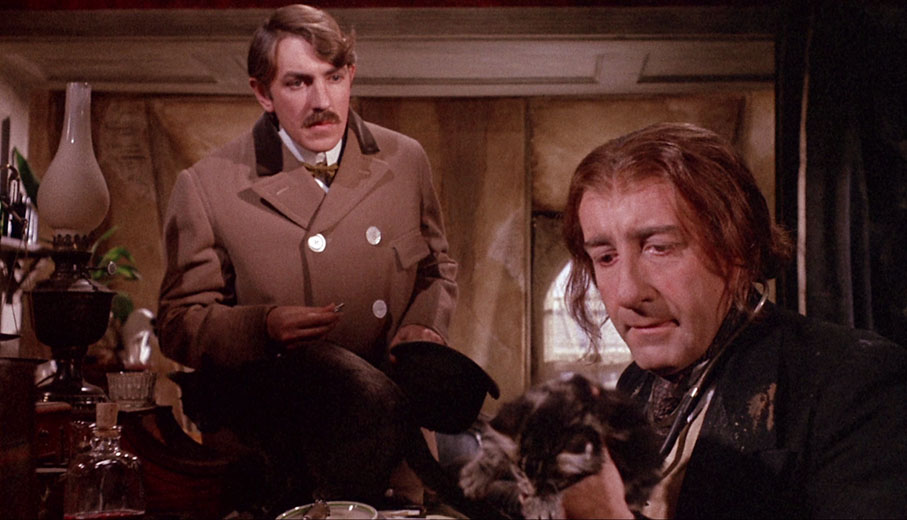
The linear PCM mono 1.0 track is in very good shape, a damage-free restoration with consistently clear dialogue and a better dynamic range than I would expect of a film of this vintage. John Barry's music sounds particularly good.
The expected English subtitles for the deaf and hearing impaired are available if needed.
Audio Commentary with Jo Botting and Vic Pratt
BFI film curator Jo Botting and DVD and Blu-ray producer Vic Pratt deliver an engaging commentary on the film, along the way providing details on the careers and even personal lives of cast and crew members and offering opinion on specific scenes. They repeatedly reference contemporary reviews and are often dismissive of the more negative comments in a way that borders on being a tad condescending but thankfully never becomes so. As mentioned in the review, Botting regards it as one of her favourite films but Pratt is more critical and singles out some of the elements that I also had issues with.
Bryan Forbes Interview (101:15)
Conducted by filmmaker Ray Fowler on 9 August 1994 for The British Entertainment History Project, this talk with director and actor Bryan Forbes, which runs under the film like a second commentary track, is an excellent inclusion. Forbes talks openly and in captivating detail about his early theatre work, his time as the head of the Elstree Studio, forming his own production company, how much easier it once was to get a worthwhile project greenlighted, and more. There are some really interesting stories here, including one about a film starring Edward Woodward and Nanette Newman that he had to pull the plug on when it became clear that its young first-time director was going to go wildly over-schedule and over-budget. As it comes to a close he says to Fowler that he'll try to find more time and do another session. I don't know if this actually happened, but I'd definitely be up for it.
Box of Delights (20:19)
An enjoyable chat with leading lady Nanette Newman, who has fond memories of the making the film and provides some useful insight into Forbes' approach to specific elements and scenes, as well as sharing a couple of anecdotes about working with Michael Caine and Peter Sellers.
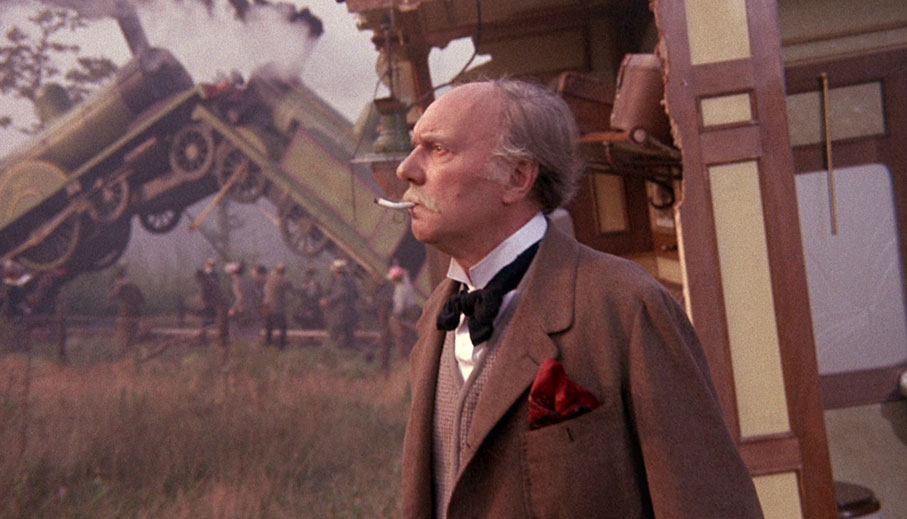
Box Cutting (9:24)
Assistant editor Willy Kemplen recalls first meeting Bryan Forbes as a young boy on the set of John Huston's Moulin Rouge, has a story about the consequences of lighting the Royal Crescent in Bath with huge lights known as Brutes, recalls that Tony Hancock spent his time between takes looking glum on his own, and that the film was a pleasure to work on.
Chasing the Cast (10:15)
Second assistant director Hugh Harlow remembers feeling that the film had a very relaxed schedule after years of fast turnarounds on Hammer movies, has an engaging story about losing track of Wilfred Lawson, another about Tony Hancock rehearsing his lines whilst walking around outside on his own, and more.
Theatrical Trailer (3:34)
"It's a downright darned good laugh" we are assured by a narrator in the sort of voice I tend to associate with the filler material that accompanied the main features when I went to the cinema as a kid. A standard trailer, though in an interesting barometer of the times, it includes a credit for "Michael (Alfie) Caine" and describes Peter Cook and Dudley Moore as "those two brilliant satirists of the theatre."
Image Gallery
16 slides of promo material, including plenty of posters, which are rather good.
Booklet
Following full movie credits, we have an enthusiastic and engagingly written appreciation of the film by Louis Barfe, who is a big fan of the film and usefully highlights some of the differences between it and the source novel. Next we have extracts from Bryan Forbes' autobiographies Notes for a Life and A Divided Life in which he looks back at the making of the film and his feelings about Tony Hancock and Peter Sellers. An extract from Michael Caine's autobiography, What's It All About? recalling his work on the film is followed by a reproduction of the original introduction to the source novel. Louis Barfe's love of the film is then balanced a tad by extracts from contemporary reviews, although two of them are similarly enthusiastic.
This is a film I thought I was predisposed to like and like a lot, but much of it just didn't quite click for me, despite the sizeable pool of talent involved. I'm still likely to intermittently revisit it for the bits I did enjoy, and know for a fact that I'll be showing Wilfred Lawson's sequences to anyone and everyone who walks through my front door. As ever, I'd advise you to not take my word for it and give it a look, as there's a fair chance you'll love it as much Jo Botting and Louis Barfe, and the disc itself is well up to the usual Indicator standards.
|